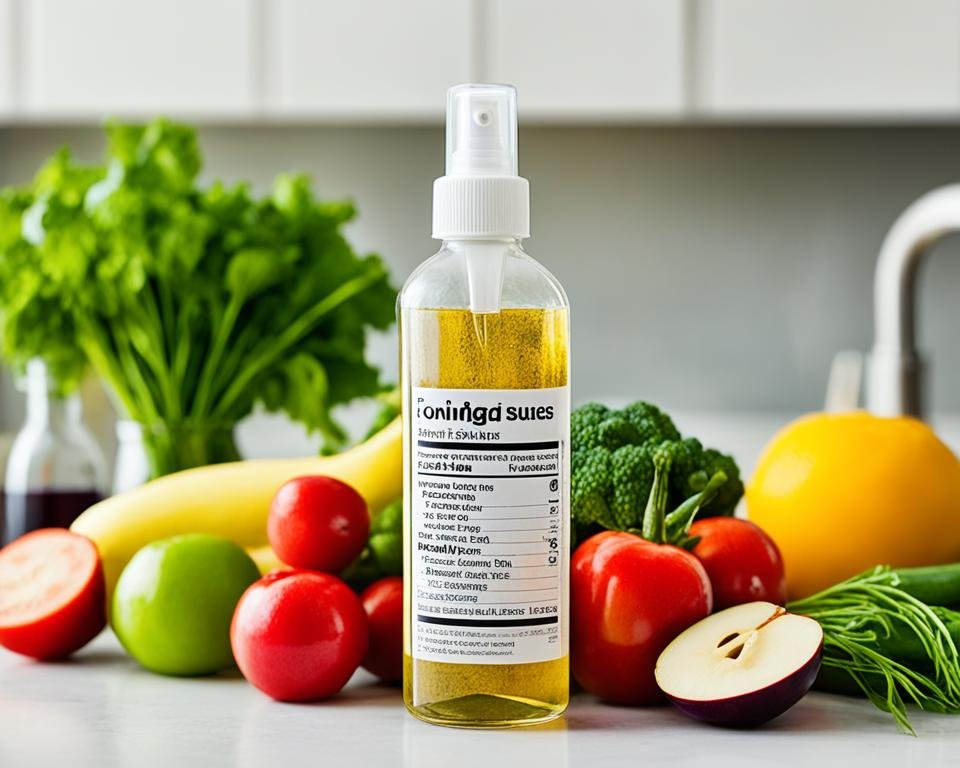Vinegar is a pantry staple that offers a multitude of uses beyond just adding a tangy flavor to your favorite dishes. From cleaning your home to enhancing your culinary creations and even promoting health, vinegar is a versatile ingredient that deserves a place in every kitchen. In this comprehensive guide, we will explore the various uses of vinegar, from its cleaning prowess to its potential health benefits.
Key Takeaways:
- Vinegar is a versatile ingredient that can be used for cleaning, cooking, and even skincare.
- It can be used as a natural, eco-friendly cleaner for various surfaces in your home.
- When used in cooking, vinegar adds flavor and tenderizes meats.
- Vinegar has potential health benefits, including aiding in digestion and weight loss.
- It can also be used to eliminate odors, control weeds, freshen laundry, and care for pets.
Vinegar as a Household Cleaner

Vinegar is a powerful and natural cleaning agent that can be used to tackle various cleaning tasks in your home. Not only is it effective, but it is also affordable and environmentally friendly, making it a popular choice for those looking for natural cleaning solutions.
When it comes to vinegar cleaning solutions, there are several options you can make at home using common household ingredients. These solutions are not only effective but also free from harsh chemicals that can be harmful to your health and the environment. Here are a few vinegar cleaning solutions for different surfaces and appliances:
Vinegar and Water All-Purpose Cleaner
Mix equal parts of vinegar and water in a spray bottle. This solution is perfect for cleaning countertops, windows, mirrors, and other surfaces. It cuts through grease and grime, leaving your surfaces clean and streak-free. Simply spray the solution onto the surface, wipe with a clean cloth or paper towel, and enjoy the sparkling results.
Vinegar and Baking Soda Scrub
For tougher cleaning tasks, such as removing stains or buildup on sinks, toilets, or showers, a vinegar and baking soda scrub can work wonders. Sprinkle baking soda on the surface, then spray it with vinegar. The mixture will create a foaming action that helps to loosen dirt and grime. Use a scrub brush or sponge to scrub the surface gently, then rinse with water.
Vinegar and Lemon Juice Glass Cleaner
If you want to add a fresh scent to your glass cleaning routine, try combining vinegar and lemon juice. Mix equal parts of vinegar and lemon juice in a spray bottle, then use it to clean windows, glass tables, and other glass surfaces. This solution not only cuts through dirt and smudges but also leaves behind a pleasant citrus aroma.
In addition to these solutions, vinegar can also be used to clean appliances like microwaves and coffee makers, remove stains from carpets and upholstery, and even freshen up your laundry. Its natural acidity helps to break down dirt and grime, making it a versatile and effective household cleaner.
Remember, when using vinegar as a cleaner, it’s important to test it on a small, inconspicuous area first to ensure it doesn’t cause any damage or discoloration. Some surfaces, such as marble or stone, may be sensitive to acidic cleaners like vinegar.
With vinegar as your go-to cleaning solution, you can enjoy a sparkling clean home without the use of harsh chemicals. It’s natural, cost-effective, and safe for you and your family.
| Cleaning Solution | Uses |
|---|---|
| Vinegar and Water All-Purpose Cleaner | Cleaning countertops, windows, mirrors, and other surfaces |
| Vinegar and Baking Soda Scrub | Removing stains or buildup on sinks, toilets, showers |
| Vinegar and Lemon Juice Glass Cleaner | Cleaning windows, glass tables, and other glass surfaces |
Cooking with Vinegar

Vinegar is not just for cleaning; it’s also a fantastic ingredient in the kitchen. With its tangy flavor and acidity, vinegar can add depth and brightness to your dishes. Whether you’re marinating meat, creating flavorful dressings, or experimenting with new recipes, vinegar is a versatile pantry staple that can elevate your culinary creations to new heights. Here are a few ways to incorporate vinegar into your cooking:
- Marinades: Vinegar can tenderize and infuse meat with flavor. Create a simple marinade by combining vinegar with herbs, spices, and your choice of oil. Allow the meat to marinate for several hours or overnight for maximum flavor.
- Dressings: Vinegar is the key ingredient in creating delicious dressings. Combine vinegar with olive oil, Dijon mustard, honey, and spices to make vinaigrettes that will enhance the flavors of your salads and vegetables.
- Sauces and Reductions: Add a splash of vinegar to sauces and reductions to brighten and balance the flavors. Whether it’s a rich tomato sauce or a tangy pan sauce, vinegar can add complexity to your dishes.
- Pickling: Vinegar is a crucial component in pickling vegetables, creating that classic tart and tangy flavor. Experiment with different vinegars, such as white vinegar or apple cider vinegar, to achieve your desired taste.
Get creative in the kitchen and explore the world of vinegar-infused recipes. The possibilities are endless, from tangy and refreshing salads to savory meat dishes that are bursting with flavor. Don’t be afraid to experiment and find your favorite vinegar combinations.
“Vinegar adds a zing to my dishes that takes them to the next level. It’s my secret ingredient for creating bold and vibrant flavors.” – Chef Emily Wilson
So, the next time you’re in the kitchen, reach for that bottle of vinegar and let its acidity and versatility transform your dishes. Cooking with vinegar opens up a whole new world of flavors and culinary experiences that will delight your taste buds.
Health Benefits of Vinegar

Vinegar, a centuries-old remedy, offers remarkable health benefits that can improve digestion, aid in weight loss, and contribute to overall well-being.
Digestive Health
Vinegar has been traditionally used for its positive effects on digestion. Its acidic nature can stimulate the production of digestive enzymes, helping to break down food and enhance nutrient absorption.
Moreover, vinegar’s acetic acid content supports the growth of beneficial gut bacteria, which plays a crucial role in maintaining a healthy digestive system. By promoting gut health, vinegar can alleviate issues like bloating, indigestion, and acid reflux.
Weight Loss Aid
For those striving to shed a few pounds, vinegar can be a helpful addition to a weight loss journey. Studies suggest that vinegar can increase feelings of satiety, leading to reduced calorie intake and enhanced weight management.
Additionally, vinegar may have a positive impact on blood sugar levels. It can improve insulin sensitivity, potentially reducing cravings and preventing excessive spikes in blood glucose levels.
One type of vinegar known for its weight loss properties is apple cider vinegar. Made from fermented apples, apple cider vinegar is believed to have a unique blend of antioxidants and nutrients that support weight loss when incorporated into a balanced diet and exercise regimen.
Overall Well-being
Vinegar’s health benefits extend beyond digestion and weight management. Consuming vinegar regularly may have a positive impact on various aspects of overall well-being. It has been associated with:
- Reduced cholesterol levels
- Improved heart health
- Enhanced immune function
- Lower blood pressure
- Protection against certain diseases
While more research is needed to fully understand the mechanisms behind these benefits, incorporating vinegar into your daily routine may contribute to a healthier lifestyle.
Incorporating vinegar into your diet is easy. You can mix it into dressings, sip it diluted in water, or use it in marinades. However, it’s important to note that excessive intake of vinegar may have potential side effects, such as tooth enamel erosion or irritation of the throat. It’s always best to consult with a healthcare professional before making any significant dietary changes or starting a new regimen.
Vinegar for Odor Removal

Say goodbye to unpleasant odors with vinegar. Whether it’s a lingering smell in your kitchen, bathroom, or any other area of your home, vinegar can come to the rescue. Not only is it an effective solution, but it’s also natural and safe to use.
When it comes to odor elimination, vinegar works by neutralizing the source of the smell, rather than just masking it with fragrances. Its acidic properties help break down the odor-causing compounds, leaving your space fresh and odor-free.
There are different ways you can use vinegar to remove odors:
- Vinegar Spray: Mix equal parts vinegar and water in a spray bottle. Spritz the solution in the air or on surfaces where the odor is coming from, such as countertops, floors, or fabrics. Let it sit for a few minutes before wiping away.
- Vinegar Soak: For items that are washable, like clothes, towels, or curtains, you can soak them in a mixture of vinegar and water before laundering. This helps eliminate stubborn smells.
- Vinegar Bowl: Place a small bowl of vinegar in a room that suffers from persistent odors. Leave it overnight or for a couple of days, and the vinegar will absorb and neutralize the smell.
Additionally, vinegar can be used to eliminate specific types of odors:
“Vinegar is a versatile odor eliminator that can tackle a variety of smells, including those from cooking, pets, and stale odors. Its natural properties make it a go-to solution for odor removal.”
Remember to always test vinegar on a small, inconspicuous area before using it on a larger surface or item, especially if it’s delicate or prone to discoloration.
Implementing vinegar as a natural odor-reducing method not only saves you money on expensive air fresheners but also reduces your exposure to potentially harmful chemicals. Give it a try and see the difference it makes in your home!
| Benefits of Using Vinegar for Odor Removal | Effective and Natural | Affordable | Versatile |
|---|---|---|---|
| Neutralizes and eliminates odors without masking them | Does not contain harsh chemicals | Costs significantly less than commercial air fresheners | Works on various surfaces, fabrics, and rooms |
| Safe for you, your family, and pets | Environmentally friendly | Readily available in most households | Can be used in kitchens, bathrooms, living areas, and more |
Vinegar as a Natural Weed Killer

Chemical-free weed control is possible with vinegar. It’s a safe and environmentally-friendly solution that can help you combat those pesky weeds in your garden and outdoor spaces. Vinegar contains acetic acid, which has herbicidal properties that can kill weeds by breaking down their cellular structure.
To use vinegar as a weed killer, follow these simple steps:
- Choose the right type of vinegar: White vinegar with an acidity level of 5% or higher is suitable for weed control. Avoid using vinegar with lower acidity percentages as they may not be as effective.
- Apply vinegar directly: Pour undiluted vinegar into a spray bottle or a watering can with a sprayer attachment. Make sure to avoid spraying any desirable plants as vinegar can also damage them.
- Target the weed: Spray the vinegar directly onto the leaves and stems of the weeds, ensuring thorough coverage. The acetic acid in the vinegar will work to dehydrate and kill the weeds.
- Repeat if necessary: Some weeds may require multiple applications to fully eradicate. Monitor the treated area and reapply vinegar as needed.
Remember, vinegar is a non-selective herbicide, meaning it can potentially kill any plant it comes into contact with. Take caution when using vinegar near desirable plants or in areas where you want to preserve vegetation.
“Vinegar is a natural and inexpensive solution for weed control. Its effectiveness, combined with its eco-friendly properties, makes it a popular choice among gardeners.” – Jane Thompson, Master Gardener
It’s important to note that vinegar may not be as effective on well-established perennial weeds with extensive root systems. In such cases, repeated applications and manual removal may be necessary.
Precautions when using vinegar as a weed killer:
- Wear protective clothing and gloves when handling vinegar to avoid skin irritation.
- Avoid spraying vinegar on windy days to prevent drift onto desirable plants.
- Keep children and pets away from treated areas until the vinegar has dried.
- If using vinegar near edible plants, ensure it is fully evaporated before harvesting.
Using vinegar as a natural weed killer can be an effective and sustainable solution for maintaining a weed-free garden. Give it a try and enjoy the benefits of chemical-free weed control.
Vinegar for Laundry

When it comes to keeping your laundry clean and smelling fresh, vinegar can be a game-changer. Not only is it a natural and eco-friendly alternative to harsh chemicals, but it also offers a range of benefits for both your clothes and washing machine.
Vinegar fabric softener: Vinegar can serve as a fantastic fabric softener, leaving your clothes feeling soft and cozy. Simply add half a cup of vinegar to your laundry during the rinse cycle instead of using commercial fabric softeners. This not only helps to naturally soften your clothes but also reduces static cling and prevents the buildup of detergent residue.
Eliminating laundry odors with vinegar: Does your laundry sometimes come out of the machine with lingering odors? Vinegar can help eliminate those unpleasant smells. The acetic acid in vinegar acts as a powerful deodorizer, neutralizing odor-causing bacteria. Simply add half a cup of vinegar to your wash cycle to say goodbye to unwanted odors.
But how does vinegar actually work to freshen and soften laundry? The acetic acid in vinegar helps to break down detergent residue and mineral deposits, resulting in cleaner and brighter clothes. It also helps to balance the pH level of your laundry, preventing soap scum and making your clothes feel smoother.
To incorporate vinegar into your laundry routine, follow these simple steps:
- Measure half a cup of white vinegar.
- Add the vinegar to your washing machine during the rinse cycle.
- Let the machine complete the cycle and enjoy fresh and soft-smelling laundry.
While white vinegar is the most commonly used type for laundry, you can also experiment with other vinegar varieties, such as apple cider vinegar or white wine vinegar. Just make sure to avoid using vinegar on delicate fabrics or garments that require dry cleaning.
“Using vinegar as a fabric softener has been a game-changer for my laundry routine. Not only are my clothes softer, but they also have a fresh scent that lasts longer!” – Emily, avid vinegar user
So the next time you’re doing your laundry, give vinegar a try. It’s a natural and affordable solution for cleaner, softer, and fresher-smelling clothes.
| Vinegar for Laundry Benefits: | |
|---|---|
| Natural fabric softener | Leaves clothes feeling soft and cozy |
| Eliminates laundry odors | Neutralizes odor-causing bacteria |
| Breaks down detergent residue | Results in cleaner and brighter clothes |
| Prevents soap scum | Makes clothes feel smoother |
Vinegar for Skincare

Vinegar is not only a versatile ingredient in cooking and cleaning; it also has numerous benefits for your skin. Whether you’re dealing with acne or simply looking to improve your skincare routine, incorporating vinegar can be a game-changer.
One of the key properties of vinegar is its ability to balance the pH of your skin. The slightly acidic nature of vinegar helps regulate the skin’s natural pH level, which is essential for maintaining healthy skin.
When it comes to acne, vinegar can be particularly beneficial. Its antibacterial properties help fight off acne-causing bacteria and reduce inflammation. Additionally, vinegar can help to unclog pores, remove excess oil, and balance sebum production, all of which contribute to clearer skin.
A popular way to use vinegar for skincare is by creating a vinegar facial toner. This refreshing and clarifying toner can help tighten pores, remove impurities, and restore the natural pH of your skin. To make your own vinegar facial toner, follow this simple recipe:
- Mix equal parts of water and apple cider vinegar.
- Optional: Add a few drops of essential oils like lavender or tea tree oil for added benefits and a pleasant aroma.
- Apply the toner to a cotton ball and gently swipe it over your face after cleansing.
- Allow the toner to dry before applying moisturizer.
Remember to do a patch test before using any new skincare products, including vinegar-based ones, to ensure you don’t have any adverse reactions.
While vinegar can be a beneficial addition to your skincare routine, it’s essential to use it in moderation and dilute it properly. Undiluted vinegar can be harsh on the skin, so it’s best to follow recommended ratios and guidelines.
Expert Tip: “Vinegar offers natural exfoliating properties, making it an excellent ingredient for gentle exfoliation. Mix a small amount of vinegar with oatmeal or sugar to create a homemade scrub for smooth and glowing skin.” – Dr. Emily Johnson, Dermatologist
By incorporating vinegar into your skincare routine, you can harness its natural properties to promote healthier, clearer, and more radiant skin. From acne-fighting benefits to gentle exfoliation, vinegar is a versatile ingredient you don’t want to overlook.
Vinegar for Pet Care

Vinegar isn’t just for humans – it can also be a valuable tool in caring for your furry friends. From controlling pet odors to grooming and even mitigating flea issues, vinegar can be a safe and effective solution for various aspects of pet care.
Using Vinegar for Pet Odor Control
Let’s face it, pets can sometimes bring unwanted odors into our homes. Whether it’s a wet dog smell or litter box odor, vinegar can help neutralize and eliminate those unpleasant scents without resorting to harsh chemicals.
Vinegar can be used in multiple ways to combat pet odors:
- Vinegar Spray: Fill a spray bottle with equal parts vinegar and water. Lightly mist fabrics, carpets, and bedding to remove odors. Avoid spraying directly on pets.
- Vinegar Soak: Soak pet toys, collars, and bedding in a mixture of vinegar and water for a few hours. Rinse thoroughly before air-drying to remove odor-causing bacteria.
- Vinegar Carpet Cleaner: Mix vinegar with water and use it in a carpet cleaning machine to eliminate lingering pet odors from your carpets.
Vinegar for Pet Grooming
In addition to odor control, vinegar can also serve as a useful aid in pet grooming. When diluted properly, vinegar can help improve your pet’s coat and skin health:
“Vinegar can serve as a gentle and natural alternative to traditional pet grooming products.”
Here are a few ways you can use vinegar for pet grooming:
- Vinegar Rinse: After bathing your pet, mix a small amount of vinegar with water and use it as a final rinse to help restore pH balance and leave the coat soft and shiny.
- Ear Cleaning Solution: Dilute vinegar with water and use a cotton ball to gently clean your pet’s ears, helping to remove excess wax and prevent odor-causing bacteria.
- Paw Soak: If your pet’s paws are irritated or have a foul odor, soak them in a mixture of vinegar and warm water for a few minutes to help relieve discomfort and combat odor.
Vinegar for Fleas
Fleas can be a pesky problem for pets, but vinegar can offer a natural and cost-effective solution.
“Vinegar’s acidity can help repel fleas and discourage them from infesting your pets.”
While vinegar alone may not eliminate a full-blown flea infestation, it can help prevent and manage them:
- Vinegar Spray: Create a diluted vinegar spray by mixing equal parts vinegar and water. Lightly mist your pet’s fur, bedding, and other areas where fleas may be present.
- Vinegar Bath: Add a small amount of vinegar to your pet’s bathwater to help repel fleas and soothe irritated skin.
- Vinegar Collar Soak: Soak your pet’s collar or flea collar in vinegar for a few hours to enhance its flea-repelling properties.
Remember to consult with your veterinarian before using vinegar or any other home remedy on your pets, especially if they have any underlying health conditions or sensitivities. While vinegar is generally safe for pets, it’s important to use it in moderation and follow proper dilution guidelines to avoid any adverse reactions.
By incorporating vinegar into your pet care routine, you can provide your furry companions with a more comfortable and odor-free living environment, all while keeping them happy, healthy, and flea-free.
Conclusion
In conclusion, vinegar is a versatile and valuable ingredient that offers a multitude of uses. Whether you’re looking to clean your home, add flavor to your meals, or improve your well-being, vinegar is an essential pantry staple that should not be overlooked.
As a household cleaner, vinegar proves to be a powerful and natural alternative to harsh chemicals. With its antimicrobial properties, it can effectively tackle dirt, grease, and grime on various surfaces and appliances throughout your home.
When it comes to cooking, vinegar adds a tangy and acidic component that can elevate your dishes. Whether you’re using it to marinade meats, enhance the flavor of sauces, or create vibrant dressings, vinegar brings a unique taste profile to your culinary creations.
Beyond its cleaning and cooking applications, vinegar also offers potential health benefits. It can provide digestive support, aid in weight loss efforts, and even contribute to overall well-being. Incorporating vinegar into your daily routine can be a simple and natural way to promote a healthier lifestyle.
FAQ
What are some versatile uses of vinegar?
Vinegar can be used for cleaning, cooking, promoting health, and even as a natural weed killer.
How can I use vinegar for household cleaning?
Vinegar can be used as a natural and effective household cleaner. You can create vinegar cleaning solutions to clean various surfaces and appliances in your home.
Can vinegar be used in cooking?
Absolutely! Vinegar adds flavor and depth to dishes. You can use it in marinades, dressings, and various recipes.
Are there any health benefits associated with vinegar?
Yes, vinegar has several potential health benefits. It may aid digestion, support weight loss efforts, and offer other positive effects on overall well-being.
Can vinegar help with odor removal?
Yes, vinegar is an effective natural odor eliminator. You can use it to neutralize and eliminate unpleasant odors in your home.
Can vinegar be used as a natural weed killer?
Yes, vinegar can be used as an eco-friendly alternative to control weeds. It is a safe and chemical-free method for combating unwanted weeds.
How can vinegar be used for laundry?
You can incorporate vinegar into your laundry routine to freshen and soften your clothes. It can help eliminate odors and act as a natural fabric softener.
Is vinegar beneficial for skincare?
Vinegar can be used in skincare routines, including as a gentle toner and potentially as a remedy for acne.
Can vinegar be used for pet care?
Yes, vinegar has applications in pet care. It can help control pet odors, aid in grooming, and may even address issues such as fleas.




